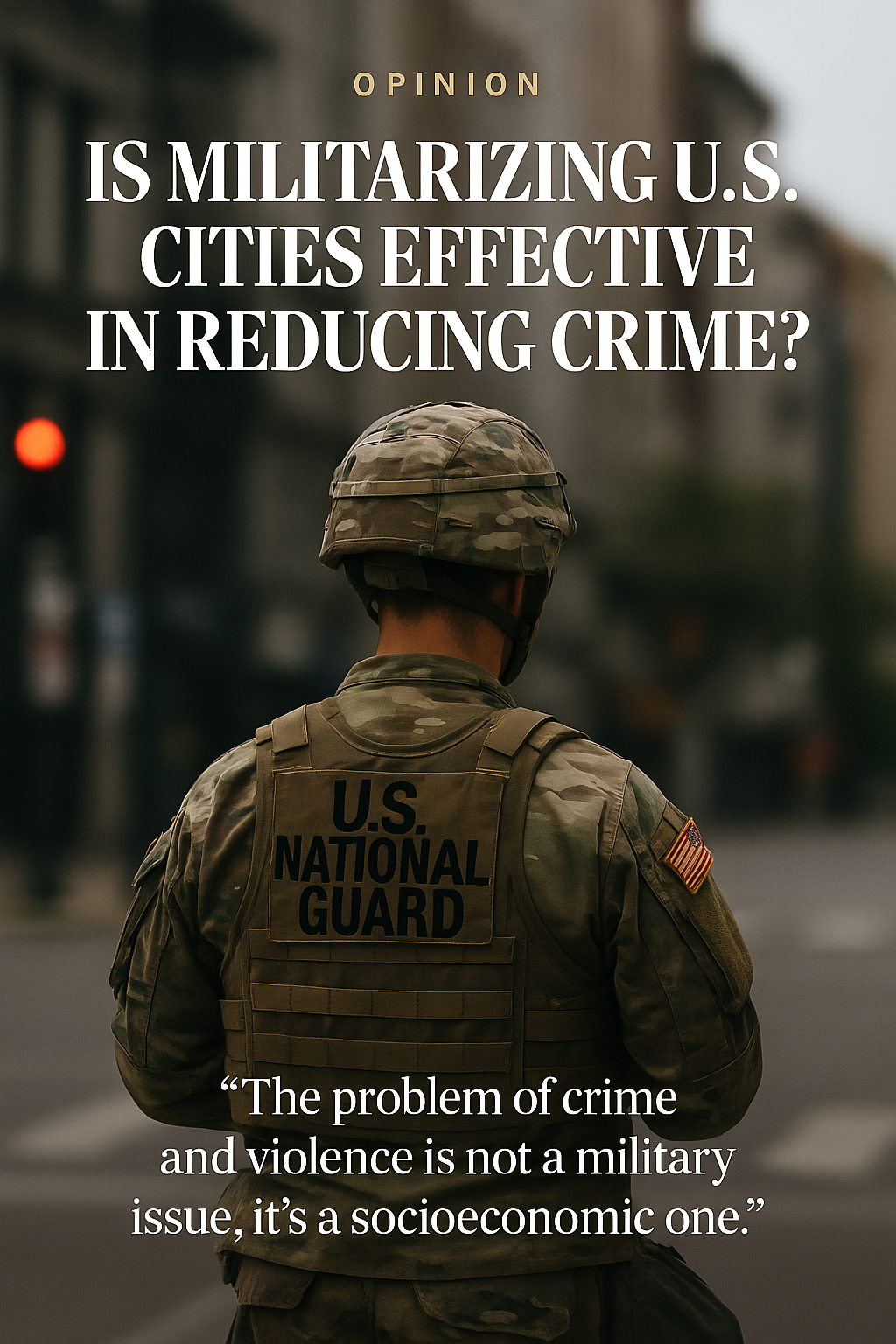Is Militarizing U.S. Cities Effective in Reducing Crime?
By Rev. Renaldo C. McKenzie, Author of Neoliberalism; Creator & Host, The Neoliberal Round
Dek
Trump talks troops and National Guard. Some cheer the optics. But crime lives where inequality and deprivation do—and soldiers can’t arrest a socioeconomic crisis.
This is The Neoliberal Round Podcast in print. I’m Renaldo McKenzie, and I have a quick note—really, a necessary one—on the newfound appetite for militarizing American cities.
Lately we’ve heard talk of sending troops to Chicago, of dispatching the National Guard to D.C. Supporters call in to cable shows to applaud the idea. One African American caller on MSNBC even said she didn’t see the problem: crime is real—Chicago, Detroit, Philadelphia—and something has to be done.
No one here denies that reality. In places with high poverty and deep income inequality, you do see theft, robberies, and shootings, including the tragic “Black-on-Black” violence we mourn too often. Some leaders report progress—Chicago officials cite a 32% reduction in certain categories—but even with improvements, crime remains a serious challenge. Philadelphians know this story, too.
But the question is bigger than fear and headlines. It’s political, constitutional, and practical:
Who has the authority?
Does a president have the right to send troops into cities and take over the work of local police? Many say no; some in Washington act as if yes. There are processes. There are limits. And there are ways to cooperate with states and cities without erasing local authority. If the rule of law matters, it matters everywhere—also when we’re afraid.
Will soldiers solve what poverty starts?
In my forthcoming work, Neoliberal Globalization Reconsidered, I return to relative deprivation. The more income inequality and poverty you have, the more crime and violence you will see. That’s not romantic; it’s descriptive. Crime here is not a military problem. It’s often not even a police-only problem. Flooding streets with uniforms may suppress incidents temporarily, but it does not change the conditions that produce the incidents.
Can we afford the theater?
We are already paying dearly. National Guard deployments cost millions per day. ICE costs millions per day. Even routine police surges are budget-burners. Meanwhile, what if those same dollars bought opportunity—jobs, training, housing, youth programs—instead of buying optics? What if we put weight behind exits from poverty, not just entries into jails?
What holds reductions?
Even if a surge coincides with lower crime, we must ask: How long can we maintain it? What holds the gains after the uniforms rotate out? If inequality keeps rising, if abject poverty expands, if we flirt with recession and cut social programs that soften the blow of high costs, then we are simply teaching desperation to get creative. You cannot out-police a broken opportunity structure.
The better lane
None of this means “no policing.” It means smart policing alongside real investment:
-
Strengthen local capacity: jobs, skills, reentry, mental health, youth work opportunities.
-
Expand programs that move people out of poverty, not just into case files.
-
Take income inequality seriously as a public safety variable, not an economic footnote.
-
Build partnerships between federal, state, and city actors that respect lawful roles rather than bulldoze them.
The economy we are actually in
Look at the broader picture: job creation last period was weak (tens of thousands in a nation of 330 million). GDP growth was stagnant. Prices ticked up. And we’re hearing about a “big, beautiful bill” that cuts programs helping families manage rising costs while handing tax breaks upward. That’s a blueprint for more relative deprivation, not less—and therefore a recipe for more crime pressure, not durable relief.
The short answer
So, is militarizing U.S. cities effective in reducing crime?
Short term, maybe; long term, no. It’s costly, constitutionally fraught, and operationally shallow. It treats symptoms, not causes. It looks strong, but leaves us weaker—financially, civically, and morally—if it becomes substitute rather than stopgap.
What works—what keeps working—is opportunity, legitimate authority, and community partnership. Soldiers can deter for a weekend. Jobs, housing, education, and fair process can stabilize for a generation.
We should choose the latter. We should fund the finish line, not just the flash.
Walk good.
Renaldo McKenzie is also President and Content Chief at The Neoliberal Corporation
“You can’t police poverty out of a paycheck.” Listen to The Neoliberal Round Podcast with Renaldo McKenzie news commentary episode entitled: Militarizing US Cities: Does it Actually Cuts Crime; or Just Cut Corners? https://open.spotify.com/episode/4FPt4H2pWMoBiIplavrGt8… via The Neoliberal Round Podcast Spotify or any stream or Listen on our YouTube Channel:


